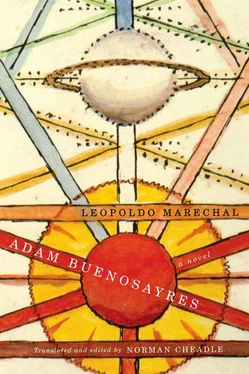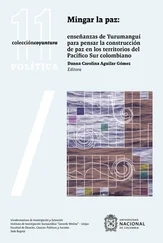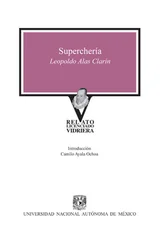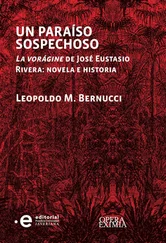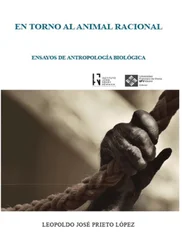Love more joyous
than a child’s funeral. 16
The girls had laughed at his metaphor, then stared in distress and incredulity at Adam, and laughed again in chorus — their pigeon breasts stuffed with laughter! But Solveig Amundsen shouldn’t have laughed with the other girls. Maybe she wouldn’t have, if she’d known that her laughter would detonate the collapse of a poetic construction and the ruin of an ideal Solveig. “I’ll have to take her my Blue-Bound Notebook,” said Adam to himself without much hope. As for Lucio Negri, how could he understand why a child’s funeral is joyful? Adam beckoned a memory from childhood — back there, in Maipú 17— evoking the little house on the hill, at night, and the dead child propped up in his little chair beneath smoking candles, the flash of sequins on his tunic, the little gold-foil wings his mother had sewn to his shoulders. The parody of an angel, true! But the angel’s eyes looked out no more. Two cotton swabs in his nostrils contained the incipient stench of rotting flesh. Green flies crawled across his powdered cheeks. Outdoors, however, guitars and accordions were making merry. Sugared mate and gin were doing the rounds. Lead-footed dancers stumbled, and furtive couples wandered off among thistles into the night (Adam understood later!), perhaps moved by the obscure urge to prolong the painful yearning of the generations with their hot blood. The drunken guitarist sang:
Little angel, you fly away
with a drop of wine,
Adam, in his innocence, wanted to know the reason for all this jubilation. Someone answered that the child in the chair wasn’t dead. He was now living a blessèd existence in God.
Little angel, you go away
with a flower in your hand 18
That had to be why a child’s funeral was a festive occasion. It meant going away to live eternally in another, thanks to the eternal virtue of the Other. Solveig Amundsen probably didn’t know this. All the same she shouldn’t have laughed at Adam that afternoon, because she too, unawares, was living within him an existence emancipated from the four seasons. “I’ll take her my Blue-Bound Notebook,” Adam resolved in his mind.
He slowly stretched, and the bed-springs again moaned their de profundis . 19Out on Monte Egmont Street, the voices were getting louder, the hubbub of men and women who, like Lucio Negri, understood only the literal sense of things and gave themselves over entirely to the illusion of a reality as changeable as its hours and as ephemeral as its shouts, like horseflies intoxicated by the day’s nectar, grimy with sweat and pollen, buzzing with relish beneath a sun that would go down as surely as they would. “Bah!” thought Adam ill-humouredly. “Lucio Negri will be powerless to prevent the day from eventually losing its worn-out alphabet or the world from tottering as did Don Aquiles, the silly old schoolmaster of Maipú, when looking for his misplaced spectacles among the schoolboys’ bags. Nor — alas! — will he forestall the moon turning to blood, or the sky being rolled up like a scroll.” The tremendous words of the Apocalypse thundered in his ears from the night before: Sicut liber involutus . 20Adam had stopped reading at that image and held his breath to listen to the hard, ominous silence of the night. There, in the heart of stillness, he seemed to hear the click of great springs breaking loose, a crunch of forms being instantly annihilated, an insurrection of atoms repelling one another. Terror-struck, Adam had fallen to his knees and for the first time felt his clumsy prayer reach the heights that had been denied him so many times before. Surely that sacred dread was a prelude to the living science that his soul, weary of dead letters, had been longing for. A sacred dread. But how easily it melted away now into the noise and colour of the new day!
Propping himself up, Adam Buenosayres reached out to the bevy of pipes calling out to him from the table. He chose Eleonore, 21with its cherry stem and porcelain bowl, and carefully filled it with tobacco from Uruguay that for a moment would become his soul. Skilfully lighting up, he breathed in the soul of Eleonore, then exhaled and watched it curl in the air, a dragon of smoke. He resumed the sweet horizontal posture of sleep and death, and savoured the delight of smoking inside his closed cubic space, in that penumbra where forms unfleshed themselves to the point of resembling numbers. For some time now he had been suffering one of two kinds of anxiety when he woke up: either he had the unspeakable impression of opening his eyes onto a strange world whose forms, even that of his own body, struck him as so absurd that he was promptly plunged into a state of fear and apprehension of ancient metamorphoses; or else he stumbled into this world as though into a bazaar full of hopelessly pawed-over objects. But there had been a time when days would begin with his mother’s song:
Four white doves,
four blue ones,
four little red ones,
death gives to me. 22
A little boy rubbing his blue eyes, pulling on clothes pell-mell as he rushed out to the morning that opened like a book filled with ravishing images! Later, Don Aquiles had read aloud in class the first stammerings of Adam’s ecstasies and pronounced judgment: “Adam Buenosayres will be a poet.” The other children clapped astonished eyes on Adam; he turned pale, his essence laid bare, the exact form of his anxieties exposed by that pedant from Maipú who, moreover, believed in the immutable regularity of the cosmos and who, every morning, watch in hand, used to invigilate the sun’s rising, lest it deviate from the hour specified in the almanac and incur his reproof. Don Aquiles limped methodically, and the schoolchildren, choking with laughter, would sing to the rhythm of his hobbled gait:
Coo-coo, coo-coo,
sang the frog,
coo-coo, coo-coo,
beneath the water. 23
Suddenly the old man stops beside Adam’s desk and looks at him: what a gaze, filtered now through memory, through bluish spectacles, his octopus eye lurking in navy blue waters!
Adam Buenosayres fondly reviewed in mente those figures from his childhood. But old images and new conflicts alike were being thrust aside by his day’s arduous launch, especially now that Eleonore, the pipe smoked before breakfast, was steering him into tobacco’s subtle, exceedingly noble, altogether poetic inebriation. “Glory to the Great Manitou,” he recited in his soul, “for he has given humans the delight of Oppavoc!” 24Better still, under the influence of the sacred leaf, his paralyzed will seemed to be reviving: he looked again at the objects in his room and this time found the pomegranate and rose worthy of an interest bordering on praise ( splendor formae! ); then he trained his ears on the din in the street, but inclined now to a benevolent attitude. At that moment, a terrific commotion inside the house hijacked his attention. Irma! Monte Egmont Street left behind, she was climbing the stairs amid a clatter of pails and brooms; she sang to the withered canary, praised the prudent cat, laughed at the bald scrub-brush, cursed the bobtailed duster. Next he made out the clomp of her shoes in the study and the creak of the furniture she was ruthlessly punishing. No doubt about it, Irma was one big unabashed shout. But an eighteen-year-old shout… and Adam had told her that her eyes were like two mornings together, or maybe he’d kissed her. It had been springtime, and perhaps the strong smell of the paraísos 25 had stirred their blood — hers, as she spread the sheets over his bed, all of her curving like a live bow; his, when he left off reading to look at what she wished him to see, even though he felt she didn’t want him to look, not suspecting that she wanted him not to suspect that she wanted him to see, O Eve! And Adam had followed the line of her bare arms which, as she raised them, revealed two dark thatches of fleece, or he saw the flash of thighs, dark olive like the skin of apples. A thick fog suffused him suddenly, erasing all memory and understanding until he was left prey to an aggression that willed him, trembling, toward Irma. And when Adam’s eyes asked “yes?” she answered “yes” with hers. Then it was as though he lost this world (forgetting it and himself) only to find it again afterward (remembering it and himself), but a world now without lustre, sullied by coarse melancholy, as though his shipwrecked soul were blind to the intelligible grace that illumines things. Without a glance or a word, they parted company at last. Adam heard her laughing on the staircase, then prattling below as if nothing had happened. He was left to savour his shame, his useless remorse, angry at himself for having fallen again into Nature’s famous trap (Hail, old Schopenhauer!). 26Of course! Nature played with the dishonour of the poor freak who, originally meant for paradisal beatitude, had scandalously fallen to earth and, like an insect at night, been singed by any glimpse or simulacrum of his first happiness.
Читать дальше
